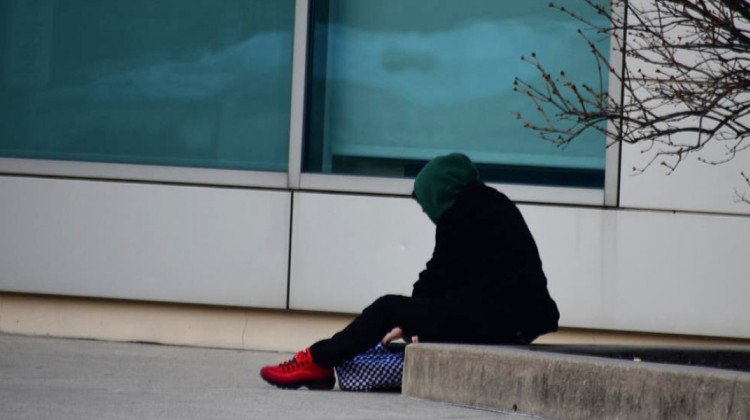
Marissa Miller, with Trans Solutions and Fletcher Elliot, youth transgender program manager at Damien Center
Two Indianapolis community organizations will launch a program aimed at preventing HIV infections for young transgender persons of color.
WFYI’S Taylor Bennett spoke with Marissa Miller, CEO at Trans Solutions and Fletcher Elliot, youth transgender program manager at Damien Center, about the partnership and the goal of addressing health disparities and reducing barriers.
Taylor Bennett, WFYI: Marissa, did this partnership come out of a need to serve those that were underserved?
Marissa Miller: The partnership, you know, initially started what we were thinking about not HIV, not taking care of people that were HIV positive, just really, for once, having an organization that was structured, and that was centered in just taking care of the person — restorative justice. We had enough agencies across the Indianapolis area that were doing a fantastic job of taking care of people that were HIV positive. And that's why the Damien Center was chosen as a partner, because historically, they've done an amazing job with taking care of people that are HIV positive, you know. They've had the opportunity, if you look at their numbers, something that is not often shared, a nice amount of clients that are attached to the data center are black and brown bodies. And so, I started talking to Alan, the Executive Director, way before we even decided to write for CDC 2203, about the needs of the trans community. And so, we were very careful with partnerships because we did not want just any old partnership, and we were not interested and business as usual, and Alan heard us. And without a dime, without a dollar, they be can begin to put things together and help us put put together things that translation so that the clients that were walking in the door, prior to our funding arriving had the opportunity to be serviced, whether they were trans, whether they were HIV positive or not. And then we wrote the CDC grant and are grateful to have the opportunity to have Fletcher and their team in the building. And it was it was past time in Indiana that we had conversations, not just about health, but about policy and about procedure and had conversation about trauma informed care. And we were able to talk about bodies that were attached to trans people. And so, we have the opportunity of the next five years, through this particular project, to take care of people in the Marion County area that are black and brown, that identify as trans and non binary from the ages of 13 to 24. And so, we're excited
Bennett: Sometimes it just starts with conversations.
Miller: Yeah, it does.
Fletcher Elliot: Definitely, like a very big time for us because school is out. And a lot of those black and brown, like teens, especially are looking for safe places where they can be themselves because school for them was a safe space for them to be from eight to two, and then now they're in the house or like with friends and they're not able to be them true selves. And so, there's this regression back to where like, 'No, I actually want to be this person, I am this person, there is no want, this is who I am.' And this will be a safe space for me to be who I am from these hours.
Miller: But then I can never remember when I was in high school gender bender really didn't have definitions as we do today to talk about who I was and how I was feeling. And I remember like going to school was the only time that I felt affirmed. And was the only time that I was able to utilize those things, clothing, pieces of clothing and articles and my things that made me feel affirmed. And so, it's so important, as Fletcher said, school is a safe place. While it's not often sometimes said because of bullying and because of lack of education and training and cultural responsibility, not just cultural competency. Competency means we know, responsibility means we take action and so, we really want to be a beacon for the youth this summer to have the opportunity to come in, you know, we've got a wonderful space in our agency for they can just come hang out — just be their authentic selves. And we're so excited to have Fletcher leading this project with the youth and the experience that they will bring to the project.
Bennett: Thank you both for being here. I appreciate your time.
Elliot: Thank you for having us.
 DONATE
DONATE






 Support WFYI. We can't do it without you.
Support WFYI. We can't do it without you.